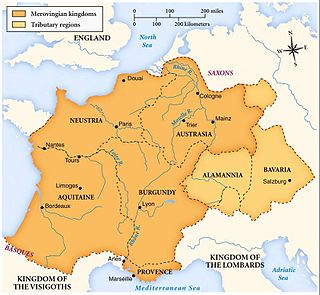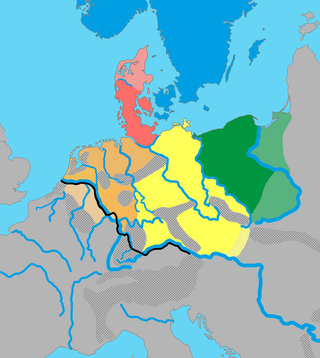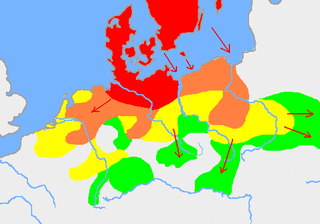Related Research Articles

The Merovingian dynasty was the ruling family of the Franks from around the middle of the 5th century until 751. They first appear as "Kings of the Franks" in the Roman army of northern Gaul. By 509 they had united all the Franks and northern Gallo-Romans under their rule. They conquered most of Gaul, defeating the Visigoths (507) and the Burgundians (534), and also extended their rule into Raetia (537). In Germania, the Alemanni, Bavarii and Saxons accepted their lordship. The Merovingian realm was the largest and most powerful of the states of western Europe following the breaking up of the empire of Theodoric the Great.

Clovis was the first king of the Franks to unite all of the Frankish tribes under one ruler, changing the form of leadership from a group of petty kings to rule by a single king and ensuring that the kingship was passed down to his heirs. He is considered to have been the founder of the Merovingian dynasty, which ruled the Frankish kingdom for the next two centuries. Clovis is important in the historiography of France as "the first king of what would become France".
Clovis may refer to:

Theodoric is a Germanic given name. First attested as a Gothic name in the 5th century, it became widespread in the Germanic-speaking world, not least due to its most famous bearer, Theodoric the Great, king of the Ostrogoths.

Neustria was the western part of the Kingdom of the Franks during the early middle ages, in contrast to the eastern Frankish kingdom, Austrasia. It initially included land between the Loire and the Silva Carbonaria, in the north of present-day France, with Paris, Orléans, Tours, Soissons as its main cities. The population was therefore originally largely Romanised.

The Kingdom of the Franks, also known as the Frankish Kingdom, the Frankish Empire or Francia, was the largest post-Roman barbarian kingdom in Western Europe. It was ruled by the Frankish Merovingian and Carolingian dynasties during the Early Middle Ages. Francia was among the last surviving Germanic kingdoms from the Migration Period era.

The Istvaeones were a Germanic group of tribes living near the banks of the Rhine during the Roman Empire which reportedly shared a common culture and origin. The Istaevones were contrasted to neighbouring groups, the Ingaevones on the North Sea coast, and the Herminones, living inland of these groups.

A rune is a letter in a set of related alphabets known as runic alphabets native to the Germanic peoples. Runes were used to write Germanic languages before they adopted the Latin alphabet, and for specialised purposes thereafter. In addition to representing a sound value, runes can be used to represent the concepts after which they are named (ideographs). Scholars refer to instances of the latter as Begriffsrunen. The Scandinavian variants are also known as fuþark, or futhark, these names derived from the first six letters of the script, ⟨ᚠ⟩, ⟨ᚢ⟩, ⟨ᚦ⟩, ⟨ᚨ⟩/⟨ᚬ⟩, ⟨ᚱ⟩, and ⟨ᚲ⟩/⟨ᚴ⟩, corresponding to the Latin letters ⟨f⟩, ⟨u⟩, ⟨þ⟩/⟨th⟩, ⟨a⟩, ⟨r⟩, and ⟨k⟩. The Anglo-Saxon variant is futhorc, or fuþorc, due to changes in Old English of the sounds represented by the fourth letter, ⟨ᚨ⟩/⟨ᚩ⟩.

Ripuarian or Rhineland Franks were one of the two main groupings of early Frankish people, and specifically it was the name eventually applied to the tribes who settled in the old Roman territory of the Ubii, with its capital at Cologne on the Rhine river in modern Germany. Their western neighbours were the Salii, or "Salian Franks", who were named already in late Roman records, and settled with imperial permission within the Roman Empire in what is today the southern part of the Netherlands, and Belgium, and later expanded their influence into the northern part of France north of the Loire river, creating the Frankish empire of Francia.

Frankish, also known as Old Franconian or Old Frankish, was the West Germanic language spoken by the Franks from the 5th to 9th century.

The Franks were a western European people during the Roman Empire and Early Middle Ages. They began as a Germanic people who lived near the Lower Rhine, on the northern continental frontier of the empire. They subsequently expanded their power and influence during the Middle Ages, until much of the population of western Europe, particularly in or near France, were commonly described as Franks, for example in the context of their joint efforts during the crusades starting in the 11th century. This expansion came about because the romanized Frankish dynasties based within the collapsing Western Roman Empire first became the rulers of the whole region between the rivers Loire and Rhine, and then subsequently imposed power over many other post-Roman kingdoms both inside and outside the old empire.
The name France comes from Latin Francia.
Dutch is a West Germanic language, that originated from the Old Frankish dialects.

Louis is the French form of the Old Frankish given name Chlodowig and one of two English forms, the other being Lewis.
The pagan religion of the Germanic tribal confederation of the Franks has been traced from its roots in polytheistic Germanic paganism through to the incorporation of Greco-Roman components in the Early Middle Ages. This religion flourished among the Franks until the conversion of the Merovingian king Clovis I to Nicene Christianity, though there were many Frankish Christians before that. After Clovis I, Frankish paganism was gradually replaced by the process of Christianisation, but there were still pagans in the late 7th century.

Gothic is an extinct East Germanic language that was spoken by the Goths. It is known primarily from the Codex Argenteus, a 6th-century copy of a 4th-century Bible translation, and is the only East Germanic language with a sizeable text corpus. All others, including Burgundian and Vandalic, are known, if at all, only from proper names that survived in historical accounts, and from loanwords in other languages such as Portuguese, Spanish, Catalan, Occitan, and French.

Germanic law is a scholarly term used to describe a series of commonalities between the various law codes of the early Germanic peoples. These were compared with statements in Tacitus and Caesar as well as with high and late medieval law codes from Germany and Scandinavia. Until the 1950s, these commonalities were held to be the result of a distinct Germanic legal culture. Scholarship since then has questioned this premise and argued that many "Germanic" features instead derive from provincial Roman law. Although most scholars no longer hold that Germanic law was a distinct legal system, some still argue for the retention of the term and for the potential that some aspects of the Leges in particular derive from a Germanic culture.

The name of the Franks, alongside the derived names of Francia and Franconia, are derived from the name given to a Germanic tribal confederation which emerged in the 3rd century AD.
References
- ↑ Julius Pokorny (1959), Indogermanisches Etymologisches Wörterbuch, Bern.
- ↑ Nederlandse Voornamenbank, Lodewijk, Royal Netherlands Academy of Arts and Sciences, Meertens Institute.
- ↑ The name Chlodwig is not now in use as a given name in Germany, but it exists as a surname, with a very limited (five individuals) found in the German phonebook as of 2013 Chlodwig verwandt.de Somewhat more widespread as a surname is the variant Klodwig (67 entries.Klodwig verwandt.de